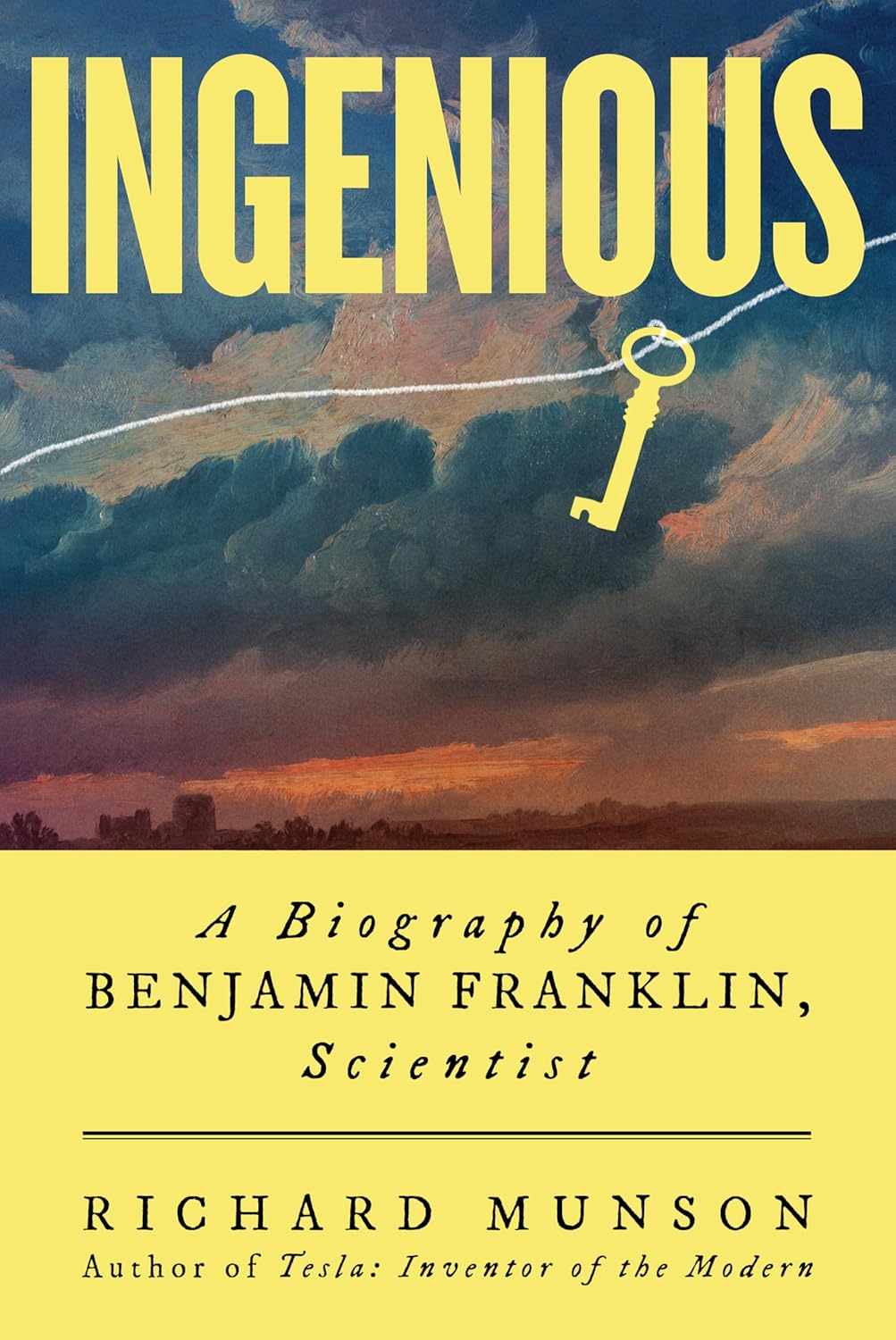A Biography of Benjamin Franklin, Scientist
Richard Munson
W. W. Norton & Company ($29.99)
“Ingenious” is how the famed polymath Benjamin Franklin (1706-1790) referred to industrious persons, including those in his own family. In sixteenth-century England, the Francklynes were farmers who owned land (though they were not aristocrats); Benjamin’s grandfather and great uncle were blacksmiths and his father, who sailed to America in 1683 at age twenty-five, ran a business making soaps and candles in Boston, where Benjamin was born in 1706—the fifteenth of seventeen children in the family. According to author Richard Munson, Franklin used the word “ingenious” seventeen times in his own autobiography; Munson has used it as the title of his new biography of the founding father that focuses on Franklin as a scientist.
Munson, whose previous books include biographies of Nikola Tesla and Jacques Cousteau, has reintroduced Franklin to our political discourse at a critical point in U.S. history: 2026 will mark the 250th anniversary of the ratification of the Declaration of Independence. The political history surrounding this landmark event is of course well known, but people often forget that the founding fathers were supportive of science and technology, believing them crucial to the progress of the nation. Franklin, in fact, was the first American widely celebrated for his science and inventions. As Munson states early in the book, he “faced the world with wonderment and systematic study—offering rich perspectives on the Enlightenment and the American experiment.”
Ingenious opens with Franklin’s iconic kite experiment in 1752; it was the culmination of his work on electricity and lightning. Franklin did not possess the modern understanding of electrons and electromagnetic radiation, though he was the first person to show that electricity is a flux from a “positive” to a “negative” charge. He also coined the term “battery” after building one by using multiple Leyden jars (the first device that could store an electrical charge), and after demonstrating that lightning is a form of electrical discharge, he invented lightning rods to protect high buildings from fires. Franklin’s 1752 book Experiments and Observations on Electricity Made at Philadelphia in America was a pioneering work highly popular in Europe, and arguably inspired others to continue to research electricity and develop the applications we all use today.
Coming from a poor family, Franklin did not have a full school education. He was, however, a voracious reader (his home library shelved 4,000 books) and a clever experimenter; Franklin’s first invention, according to Munson, was swimming flippers to speed up his favorite sport. After fleeing from Boston to Philadelphia at age seventeen, Franklin established himself as an innovative printer and a popular publisher (of the Pennsylvania Gazette and Poor Richard’s Almanack). His social inventions in Philadelphia blended the public good with his private gain; his Leather Apron Club and subscription library service were valuable contributions to the area’s intellectual life but also placed him at the cultural heart of the city. Theologically Franklin was a Deist, but he mingled freely with various religious denominations from Quakers to Freemasons. His appointment (with a trivial salary) as Postmaster of Philadelphia enabled him to sell his newspaper across the colonies and to source varied content. Franklin had a salesman’s sense for people’s needs and tastes; in Poor Richard’s Almanack he included catchy maxims (e.g., “Haste makes waste” and “Early to bed and early to rise makes a man healthy, wealthy, and wise”) to turn a yearly informational resource into a publishing phenomenon.
Franklin conducted his kite experiment at age forty-two, exactly halfway through his life; by then he was a wealthy man and could retire to devote the rest of his life to science and diplomacy. The middle chapters of Ingenious cover the second half of Franklin’s life and depict a man in his full glory—as a world-famed scientist and inventor, as well as a first-rank American diplomat who played a leading role in the Declaration of Independence in 1776, an alliance with France in 1778 (which Franklin’s popularity as a scientist in France helped cement), a peace treaty with Great Britain in 1783, and last but not least, the Constitutional Convention in 1787.
Franklin’s life spanned almost the entire eighteenth century. Ingenious reveals his paradoxical but good-spirited personality: He loved celebrity, and yet in his last will, he declared himself simply as “Benjamin Franklin of Philadelphia, printer.” He refused to seek patents on his inventions because, in his own words: “As we enjoy great advantages from the inventions of others, we should be glad of an opportunity to serve others by any invention of ours; and this we should do freely and generously.”
Franklin’s death in 1790 in Philadelphia at the age of eighty-four was mourned in the U.S. as well as Europe. Munson remarks that perhaps the most symbolic tribute was given by the French printmaker Marguerite Gérard, who created an etching (“To the Genius of Franklin”) which portrayed old Ben as a Zeus-like figure and bears a Latin caption that can be translated as follows: “He snatched lightning from the sky and the scepter from tyrants.”
Ingenious ends by discussing how perceptions and writings about Franklin’s life and legacy have changed over time. Many have criticized Franklin because he owned slaves, was a womanizer, and fathered a son out of wedlock. Generations facing economic depressions have cherished Franklin’s virtues of industry and frugality. Political historians have highlighted Franklin’s key role as a founding father, and historians of science have focused on his scientific achievements. Readers interested in learning more about the latter may also find Benjamin Franklin’s Science (Harvard University Press, 1990) by I. Bernard Cohen and The First Scientific American: Benjamin Franklin and the Pursuit of Genius (Basic Books, 2006) by Joyce Chaplin highly informative. Even (or perhaps especially) after 250 years, Franklin’s is a great life story to read.
Click below to purchase this book through Bookshop and support your local independent bookstore:
Rain Taxi Online Edition Summer 2025 | © Rain Taxi, Inc. 2025

